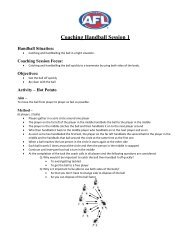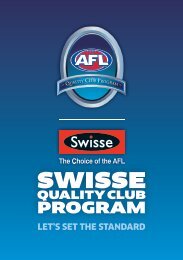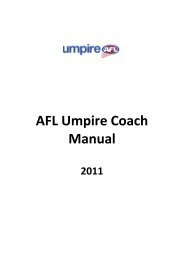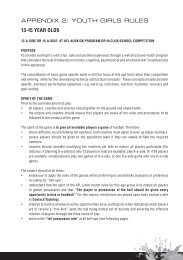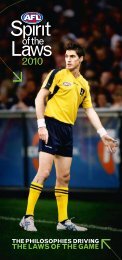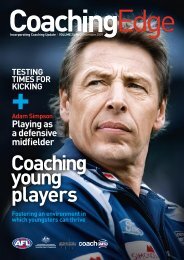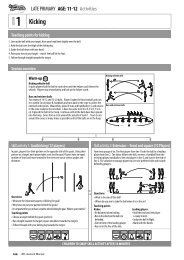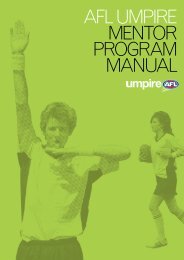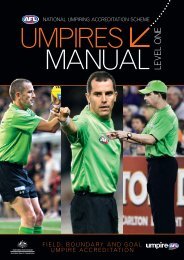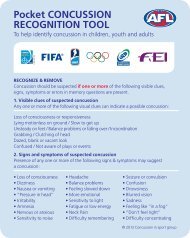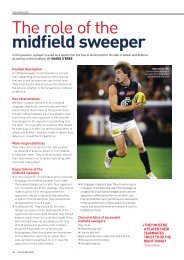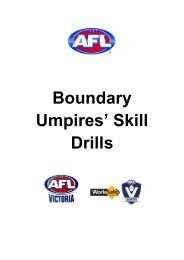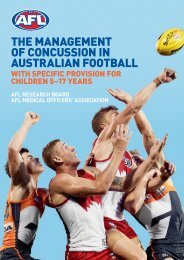2012 Youth Coaching Manual - AFL Community
2012 Youth Coaching Manual - AFL Community
2012 Youth Coaching Manual - AFL Community
Create successful ePaper yourself
Turn your PDF publications into a flip-book with our unique Google optimized e-Paper software.
In developing a coaching philosophy, players must be the overriding consideration. The sport belongs to the players and<br />
coaches should therefore have a player-centred approach. It is the coach’s responsibility to assist players to set and achieve<br />
goals. <strong>Coaching</strong> goals may be as simple as creating enjoyment or as demanding as striving to win. The coach should<br />
endeavour to ensure that the goals set by players are both achievable and in line with the overall coaching philosophy. It may<br />
help coaches to clarify their coaching philosophy by writing it down. The content will be based on the values and beliefs that<br />
come from your experience and direct your coaching.<br />
It is not enough to merely have a coaching philosophy. As coach, you must also consider how the philosophy will be<br />
communicated to players, parents and administrators. It is also reasonable to consider how to ensure that the coaching<br />
philosophy is followed and what you will do if your coaching philosophy is challenged. That is, how will you deal with the<br />
different values of different people?<br />
<strong>Coaching</strong> qualities of successful coaches<br />
<strong>Coaching</strong> qualities<br />
1. Professional preparation<br />
Examples<br />
1.1 Knowledge Knowledge of football and ability to use it in coaching.<br />
Knowledge of coaching technique.<br />
1.2 Planning Plans for each practice.<br />
No surprises, players know where they stand in the team.<br />
Establishes rules and regulations for players.<br />
Flexible – able to handle disruption to the coaching format,<br />
playing personnel, training venues, travel etc. Players lose<br />
respect for a rigid thinker unable to change with the times.<br />
Encourages players to set personal goals.<br />
Continually seeks ways to strengthen the program.<br />
Pre-plans the use of staff and facilities.<br />
1.3 Mental and physical well-being of players Shows concern for the physical and mental well-being of<br />
the players.<br />
Is a trouble shooter – keeps on the lookout for warning signs.<br />
2. Control of emotional environment<br />
2.1 Self control Maintains self control at all times.<br />
Is stable, honest and straight forward.<br />
Maintains some distance with players while encouraging a<br />
warm congenial atmosphere.<br />
Does not play the role of a dictator and run the squad like<br />
an army drill instructor.<br />
Does not succumb to apathy and start believing that other<br />
things in life are more important.<br />
Shows ‘strength of character’ e.g. When a key player or two<br />
is lost, the coach does not write off the season.<br />
Is not easily intimidated by disgruntled supporters.<br />
Does not become more irritable and short-tempered while<br />
coaching than at any other time.<br />
Does not give up when things go wrong during a contest.<br />
Does not hold grudges against certain players.<br />
<strong>AFL</strong> <strong>Youth</strong> <strong>Coaching</strong> <strong>Manual</strong><br />
23



